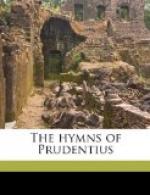127 This is, strictly speaking, an error:
it is the woman’s seed
which is to bruise the
serpent’s head. The error was perpetuated
in the Latin Church
by the Vulgate of Gen. iii. 15, ipsa conteret
caput tuum, where
ipsa refers to the woman (= she herself).
157 The epithet “white-robed” refers
to the newly-baptized converts
who received the white
robe as a symbol of their new nature. Cf.
Perist. i. 67:
Christus illic candidatis praesidet cohortibus,
and Ambrose (de Mysteriis,
vii.): “Thou didst receive (that is,
after baptism) white
garments as a sign that thou hast doffed the
covering of thy sins
and put on the chaste raiment (velamina) of
innocence, whereof the
prophet spake (Ps. li. 7), ’Thou shalt purge
me with hyssop, and
I shall be clean: thou shalt wash me, and I
shall be whiter than
snow’” (Vulg.).
199 Phlegethon (rendered “Hell"), one of
the rivers of the Virgilian
Hades, is used to express
the abode of the lost. Cf. Milton, P.
L.,
ii. 580:—
“...
fierce Phlegethon,
Whose
waves of torrent fire inflame with rage.”
The subject of the descensus ad inferos was evidently a favourite one with Prudentius and his contemporaries. It has been suggested that apart from the scriptural basis of this conception Prudentius was influenced by the so-called Gospel of Nicodemus, which embodies two books, the Acts of Pilate and the Descent into Hell. The latter is assigned by several critics to 400 or thereabouts, and gives a graphic account of Christ’s doings in Hades. Synesius deals with the subject in one of his hymns (ix.), and Mrs Browning’s translation (see the essay on The Greek Christian Poets) of a passage in that poem may be quoted:—
“Down Thou earnest, low as earth,
Bound to those of mortal birth;
Down Thou earnest, low as hell,
Where Shepherd-Death did tend and keep
A thousand nations like to sheep,
While weak with age old Hades fell
Shivering through his dark to view Thee.
* * * * *
So, redeeming from their pain
Chains of disembodied ones,
Thou didst lead whom thou didst gather
Upward in ascent again,
With a great hymn to the Father,
Upward to the pure white thrones!”
For a modern treatment of the
theme see Christ in Hades, by
Stephen Phillips.
202 The words suggest the Catacombs, and perhaps
refer to the custom
of placing in the tomb
a small cup or vase containing spices, of
which myrrh (a symbol
of death, according to Gregory of Nyssa, cf.
xii. 71) was most usually
employed. Or the allusion may be to the
practice of embalming.




